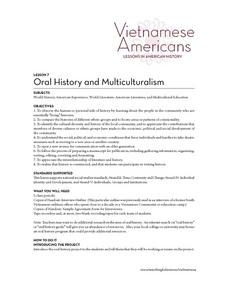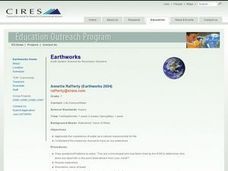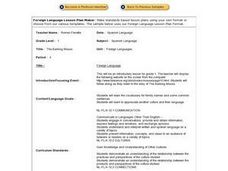Curated OER
Oral History and Multiculturalism
Students observe the human or personal side of history by assessing the background to the people in the community who are basically "living" historians. They compare the histories of different ethnic groups to identify areas of patterns...
Curated OER
Treasures Along the Silk Roads
Ninth graders examine the travels of the Silk road. In this Ancient China lesson, 9th graders analyze slides of artifacts as cultural and social representations of the Silk Road civilizations. Students create a word map and...
Curated OER
Foods and Languages of the World
Students celebrate diversity. In this multicultural appreciation lesson, students celebrate diversity by sampling food from different cultures, learning a few words in Spanish and identifying the seven different continents.
Curated OER
Treasure of the Silk Roads
Students generate world maps that act as creative writing prompts. The prompts reflect on the cultures and history of the past through their own experiences. Students create an original writing sample.
Curated OER
Earthworks
Seventh graders explore watersheds and take samples and analyze the data from a watershed in the area.
Curated OER
We Are All Responsible
Students conduct research about the issue of conservation and the environment. They focus upon the interdependence of man and nature. They write and discuss the issue of environmental preservation. Students appreciate the importance of...
Curated OER
Found Poetry with Primary Sources: The Great Depression
Pupils read a sample found poem and create one together as a class. In this Great Depression instructional activity, students select a topic, such as miners, and read primary source documents related to the topic. Pupils select one...
Curated OER
Pic-A-Fic: Choosing Fiction for Every Taste
Sixth graders examine and categorize a selection of title representing fiction genres. In this fiction genres instructional activity, 6th graders analyze and identify a variety of titles in the fiction genre. Students then find these...
Curated OER
The Numbers Game
Students examine how to calculate the part-per-million and part-per-billion units used to measure contaminant concentrations in the environment. They calculate ratios, take a quiz, analyze a sample chemical spill, and determine if...
Curated OER
Student Experiment Flies On NASA Space Shuttle!
Students design and construct an experiment that will be launched into space aboard a NASA research shuttle. How better to gain and appreciation for (and, hopefully, a love of) scientific investigation than to do real science and be...
Curated OER
Where in the World?
Sixth graders research online various types of poetry. In this poetry analysis lesson, 6th graders research different types of poetry online, their characteristics, and poets. Students create a class atlas that incorporates the seven...
Curated OER
What Do Concentrations Mean?
Students investigate the concept of climate gases and practice using the appropriate measurement terms. The lesson includes information that is used by the teacher to conduct class discussion or as a source of background for students.
Curated OER
Time That Period
Physical science starters play with a pendulum in order to experience periodicity. Detailed procedures and a worksheet are included for day one. For day two, learners will use a graphing calculator to help them plot orbit data from a...
Curated OER
Mathematics Lesson for Grade 10
There are four main topics in this bundle of lesson plans. They don't need to be taught sequentially. Each lesson plan has three parts: a starter, a main activity, and something to help consolidate and provide reflection on concepts...
Curated OER
Take a Dip: Be a Field Guide
Students create a Visitor's Field Guide for the local area in order to enhance the understanding of natural features of the area for those who may be unfamiliar with the area.
Curated OER
Teaching About Simple Machines
Young scholars identify six different simple machines. They investigate the difference between the ideal and actual mechanical advantage. Students calculate the actual mechanical advantage for several simple machines.
Curated OER
A Happy Time
Second graders listen to stories about feelings and identify their own feelings during certain times of their lives. In this a happy time lesson, 2nd graders explore writing elements as a way to communicate with a variety of audiences...
Curated OER
Let's Go Shopping
Students review and identify common vocabulary related to food, shopping, and courtesy expressions. Students then practice English language skills by shopping in classroom market while playing roles of shoppers and store personnel.
Curated OER
Mathematics Lesson for Grade 12
Twelfth graders examine multiple aspects of statistics. In this mathematical reasoning lesson, 12th graders solve problems on probability, logarithms, exponential relationships and transforming rectilinear shapes. This resource contains...
Curated OER
The Cold War And Beyond
Learners interview an adult that grew up in the United States during the Cold War to develop an understanding of the concept of mutually assured destruction. They focus the interview on how the person dealt with the threat of nuclear...
Curated OER
Boyle's Law Lab
In this gas lab, students use a pressurized soda bottle with a closed end syringe to simulate Boyle's Law. They alter the volume and watch the effects on the pressure of the gas. They plot their data and answer eight post lab questions.
Curated OER
Treasures of the Silk Roads
Students examine and discuss art objects from the Silk Roads. They analyze images of artifacts, create a word map, and develop and write a short story or poem based on the slides viewed.
Curated OER
The Banking Mouse
First graders learn about another culture and its language. In this Spanish lesson plan, 1st graders listen to a Cuban folktale. Students identify the Spanish words. Students reread the story independently. Students listen to...
Curated OER
Using Inspiration To Support Logical Reasoning
Students share descriptions of science experiments they have conducted. They create a thin film on the surface of water in order to float light objects and observe that a paper clip does, indeed, float on the surface of the water at...

























